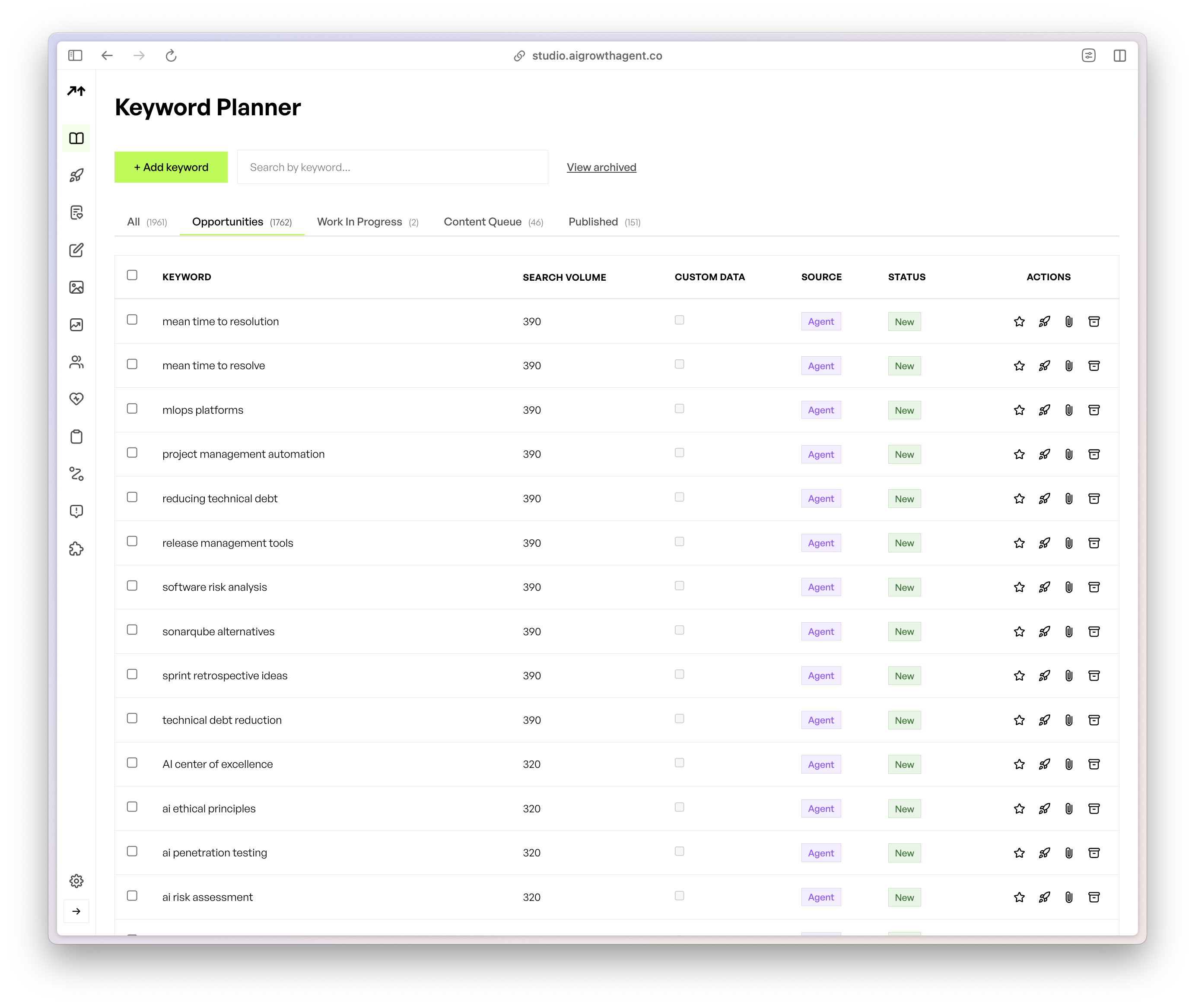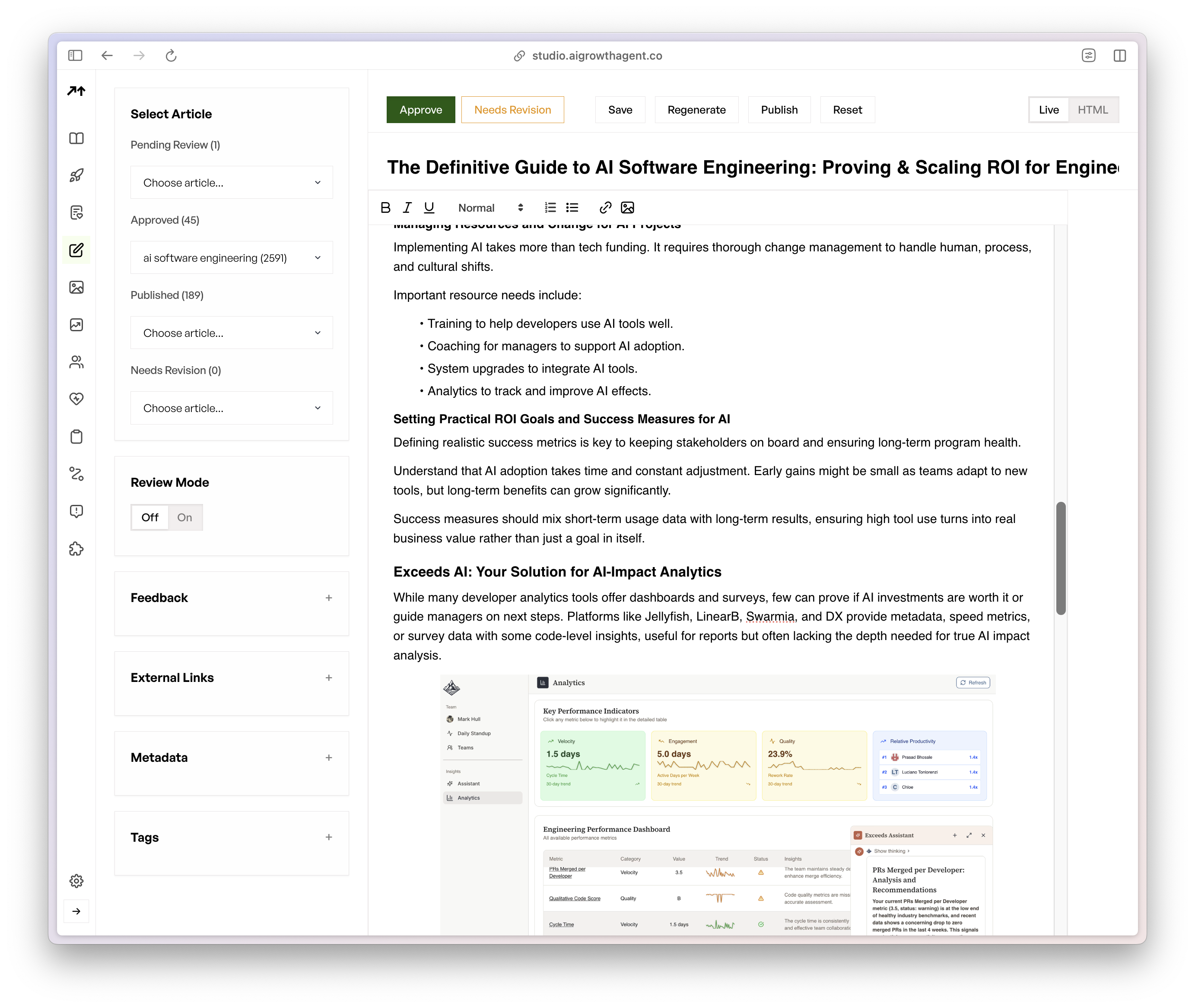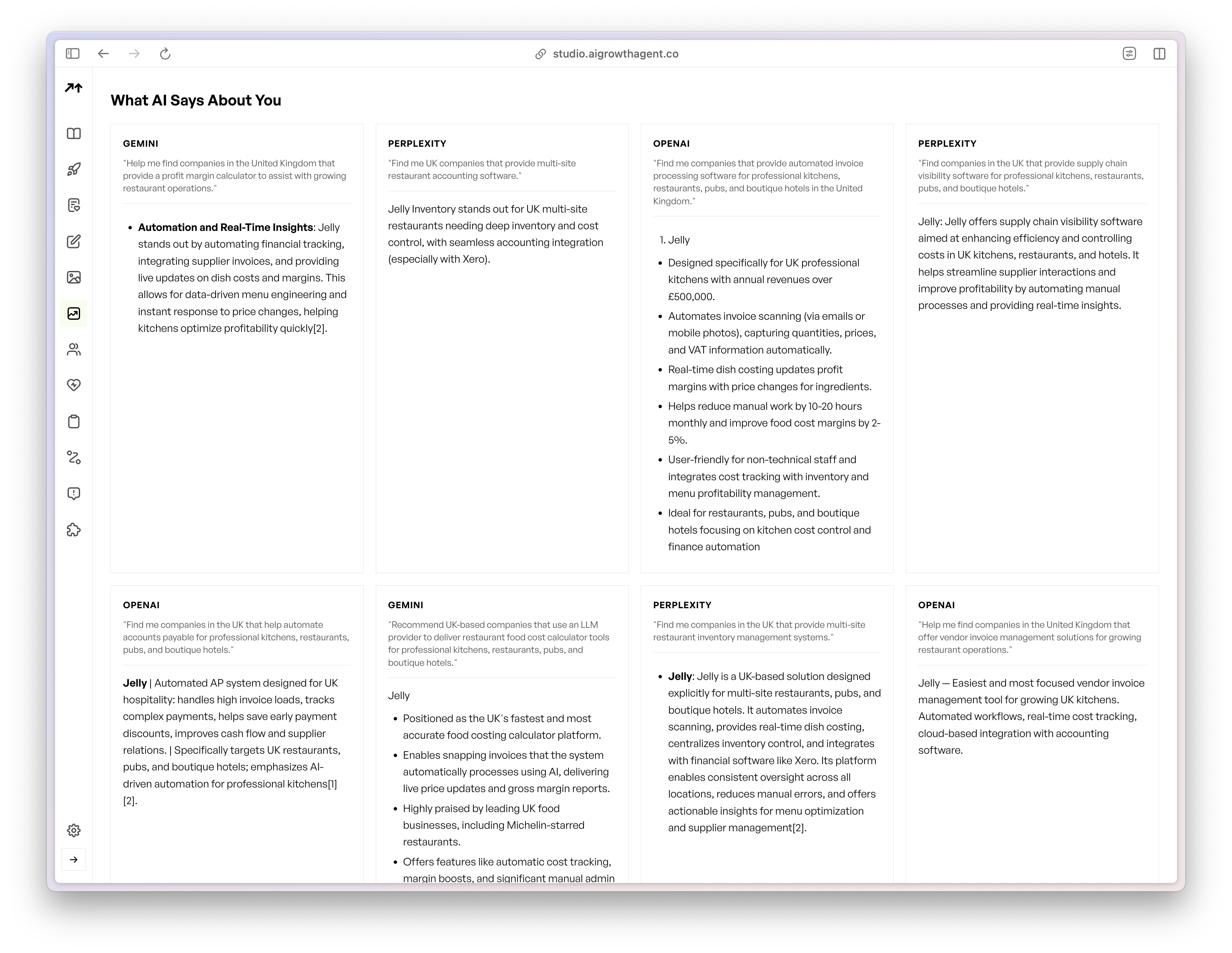AI-powered search engines are reshaping how content reaches audiences. Unlike traditional search, which matches keywords to pages, AI tools like Perplexity combine data from various sources for detailed answers, while ChatGPT and Gemini create responses based on patterns. To stand out, brands must build strong digital signals for recognition, moving beyond standard SEO methods.
For marketing leaders, this shift offers a chance to lead in visibility and authority. Brands that adapt to AI search will gain more citations and trust in their field. Those that lag risk fading as AI expands content daily, shrinking their online presence.
This guide delivers a focused technical SEO checklist to help marketing leaders optimize content for AI visibility and impact. Schedule a consultation session to explore how an automated, full-service content tool like AI Growth Agent can apply these strategies efficiently.
Why AI Search Needs a Fresh Technical SEO Approach
Shifting from Keywords to Context
AI search changes the game for online content. Traditional search engines rely on keywords, links, and site setup for rankings. AI systems, however, focus on understanding language and user needs, requiring content that’s clear, in-depth, and meaningful, not just packed with keywords.
These systems handle complex questions well, summarizing vast data into relevant answers. Tools like Perplexity break down queries into smaller parts, pulling information from multiple places to form one complete response, unlike traditional search, which links to individual pages.
Your content must match how AI interprets and combines information. It needs structure for machine processing while staying engaging for human readers.
Building Authority in AI Search
Getting cited by AI models, like Large Language Models (LLMs), sets the standard for authority today. AI evaluates content for recency, accuracy, and clarity, cross-checking data across sources. If your brand lacks strong content for a query, AI will cite a competitor instead, shaping their view as the trusted source.
Information moves fast now. Without regular, high-quality content optimized for AI, you’ll fall behind. LLMs favor fresh, detailed, and consistent material, making occasional updates ineffective.
5 Key Technical SEO Strategies for AI Search
1. Boost Visibility with Detailed Schema Markup
Basic schema markup isn’t enough for AI search. Marketing leaders should use specific types like Article, FAQPage, HowTo, AboutPage, Organization, and FactCheck to clearly define content elements. Structured data helps AI extract and combine information accurately for responses.
Go beyond simple tags. Detailed schema, such as FactCheck for data articles, builds credibility, while the Article schema adds context on authorship and dates. Consider these types:
- Article Schema: Add author details, publication and update dates, and section breakdowns.
- Organization Schema: Link all brand touchpoints with consistent business data.
- FAQPage Schema: Organize common questions with clear answers.
- HowTo Schema: Outline steps for AI to reference easily.
- FactCheck Schema: Verify claims to boost trust.
This approach clarifies connections and facts, helping AI recognize your content’s value and reliability for citations.
2. Focus on Semantic Depth for Better Content Reach
AI search success depends on content with deep meaning and broad topic coverage. Address user needs fully, cover related ideas, and anticipate follow-up queries AI might process.
Use internal links, descriptive headings, and semantic HTML to help AI parse and reference your content. Try these tactics:
- Build topic clusters to cover entire subjects, showing authority across related areas.
- Structure content to answer detailed questions with headings that reflect real queries.
- Use semantic HTML tags like article and section for a clear hierarchy.
- Link internally to show content connections and expertise.
This setup helps AI summarize your work accurately with proper credit, increasing citation chances in responses.
Schedule a Demo to Explore Our AI Content Platform for help with semantic structuring at scale.

3. Use Advanced Protocols for AI Indexing
Traditional robots.txt controls crawling, but AI search needs newer protocols for direct communication. Focus on content recency tags, detailed metadata, and quality signals to guide AI on how to interpret and cite your work.
Look into experimental methods to shape AI behavior. Key options include:
- LLM.txt: A file like robots.txt, tailored for AI, setting rules on content use and credit.
- Model Context Protocol (MCP): Metadata that explains content structure and purpose to AI.
- Freshness Signals: Use timestamps and update logs to highlight current information.
- Attribution Metadata: Add sourcing details and review markers for trustworthiness.
These steps tackle issues like data origin and accuracy, which AI values when choosing sources for answers.
4. Strengthen Brand-Wide Data for Entity Recognition
AI search optimization covers your entire brand, not just single pages. Structured data and clear facts help AI model your business correctly across platforms.
- Use a consistent Organization schema with uniform names and details on all properties.
- Link digital profiles with SameAs properties for a connected brand map.
- Optimize for knowledge graphs by aligning data in directories that AI checks.
- Coordinate content across channels for consistent messaging and facts.
A unified strategy helps AI link information about your brand, creating a stronger online presence for better authority in search results.
5. Prioritize Fresh Content and Authority Metrics
AI favors recent, trusted content with solid proof of value. Use detailed update schemas, editorial records, and regular content refresh plans to show relevance.
- Add timestamps for creation, updates, and reviews to signal currency.
- Boost authority with web visibility, expert mentions, and factual accuracy over just links.
- Track citation frequency across platforms to gauge content impact.
- Monitor AI citations to refine setups for better visibility and attribution.
Combining technical precision with smart content habits keeps your brand relevant as AI search grows.
Schedule a Demo to assess your AI search setup and plan improvements.

Common Questions About AI Technical SEO
How AI Search Engines Differ from Traditional Ones?
AI search engines process information differently from traditional systems. Classic search indexes web content by relevance and links, ranking pages through factors like backlinks and site trust.
AI, however, often creates new answers from data patterns, sometimes using Retrieval Augmented Generation (RAG). Systems like Perplexity break down complex questions into parts, combining data for direct responses instead of linking to pages. They value language understanding, context, and real-time synthesis, needing unique optimization beyond keyword focus.
Does Traditional SEO Still Matter for AI?
Traditional SEO remains a core foundation for AI search, but it isn’t enough alone. Basics like site speed, mobile design, and crawlability help AI access content effectively.
AI optimization adds layers like advanced schema, semantic structuring, and entity focus. It makes content ready for AI to interpret and cite, building on traditional SEO. Marketing leaders should see AI SEO as a step forward, not a replacement, for lasting results.
What Does Entity Optimization Mean for AI Search?
Entity optimization ensures your brand and key ideas are clear across the web with structured data and uniform naming. AI sees entities as distinct items, like businesses or concepts, and it can link across sources.
For companies, this means crafting a machine-readable profile AI can reference. Use a detailed Organization schema, keep data consistent online, and connect related entities. This helps AI tie mentions to your full profile, boosting authority and accurate citations in answers.
How to Track Content Performance in AI Search?
Evaluating AI search performance needs new methods beyond standard SEO tools. Check direct citations in AI answers on platforms like ChatGPT, Gemini, and Perplexity by testing industry queries.
Watch traffic from AI-enhanced results, like Google’s Search Generative Experience or Microsoft Copilot, which mix traditional and AI content. Track brand mentions and sentiment online, as they shape AI views of authority. Citation frequency across channels also signals impact in AI search contexts.
Which New Protocols to Watch for AI Optimization?
Several emerging protocols address AI search needs. LLM.txt, an extension of robots.txt, guides AI on content use and credit rules. Model Context Protocols (MCP) provide metadata for structure and response usage. Freshness protocols with timestamps prioritize current data, while attribution metadata adds sourcing and review details for trust.
Marketing leaders should track these developments and build flexible systems to adapt as AI standards evolve industry-wide.
Building Future Authority with AI Search
Mastering technical SEO for AI goes beyond rankings. It positions your brand as a trusted source in the generative AI era. Brands that invest in AI optimization will lead in citations and influence, while outdated methods risk losing ground.
AI systems rapidly increase content volume, changing how data is found and credited. Marketing leaders need tech-driven solutions to match the scale of AI search demands. Manual or old agency approaches often fall short.
AI Growth Agent offers an automated platform with specialized agents to build category authority for brands in AI search. It manages everything from keyword research to technical setup, like schema markup and metadata, plus direct publishing to optimized blogs.
Features like the AI Search Monitor & Performance Agent let clients track AI platform results and view content citations. Unique tools, including LLM.txt and a pioneering blog Model Context Protocol (MCP), help AI understand your content clearly.
Schedule a Demo to learn how AI Growth Agent can elevate your brand’s authority in AI-powered search.
